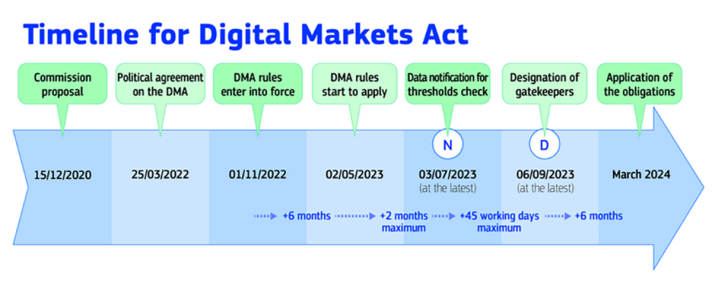What is the DMA about?
The Digital Markets Act is the EU’s law to make the markets in the digital sector fairer and more contestable. In order to do so, the Digital Markets Act (“DMA”) establishes a set of clearly defined objective criteria to identify “gatekeepers”.
Gatekeepers are large digital platforms providing so called core platform services, such as online search engines, app stores, messenger services. Gatekeepers will have to comply with the do’s (i.e. obligations) and don’ts (i.e. prohibitions) listed in the DMA.
The DMA is one of the first regulatory tools to comprehensively regulate the gatekeeper power of the largest digital companies. The DMA complements, but does not change EU competition rules, which continue to apply fully.
Legislative history of the DMA
Following the initial proposal of the European Commission in December 2020, the Regulation was adopted by the European Parliament and the Council on 14 September 2022. It was published in the Official Journal on 12 October 2022.
The DMA entered into force on 1 November 2022 and become applicable on 2 May 2023. Within two months of that date, companies providing core platform services will have to notify the Commission if they meet the quantitative thresholds and provide all relevant information. The Commission will then have 45 working days to adopt a decision designating a specific gatekeeper. The designated gatekeepers will have a maximum of six months after the Commission decision to ensure compliance with the obligations and prohibitions laid down in the DMA.
This timeline only applies to core platform services existing by 2 May 2023. Those companies providing core platform services meeting the thresholds only at a later stage will have to notify them within two months after those thresholds are met.
What does this mean for gatekeepers?
The new rules will establish obligations for gatekeepers, “do’s” and “don’ts” they must comply with in their daily operations.
Examples of the “do’s”: gatekeepers will for example have to:
- allow third parties to inter-operate with the gatekeeper’s own services in certain specific situations;
- allow their business users to access the data that they generate in their use of the gatekeeper’s platform;
- provide companies advertising on their platform with the tools and information necessary for advertisers and publishers to carry out their own independent verification of their advertisements hosted by the gatekeeper;
- allow their business users to promote their offer and conclude contracts with their customers outside the gatekeeper’s platform.
Example of the “don’ts”: gatekeepers will for example no longer:
- treat services and products offered by the gatekeeper itself more favourably in ranking than similar services or products offered by third parties on the gatekeeper’s platform;
- prevent consumers from linking up to businesses outside their platforms;
- prevent users from un-installing any pre-installed software or app if they wish so;
- track end users outside of the gatekeepers’ core platform service for the purpose of targeted advertising, without effective consent having been granted.
How will the Commission ensure that the tool keeps up with the fast evolving digital sector?
- To ensure that the new gatekeeper rules keep up with the fast pace of digital markets, the Commission will carry out market investigations.
- These will allow the Commission to:
- qualify companies as gatekeepers;
- update dynamically the obligations for gatekeepers when necessary;
- design remedies to tackle systematic infringements of the Digital Markets Act rules.
What will be the consequences of non-compliance?
Fines: of up to 10% of the company’s total worldwide annual turnover, or up to 20% in the event of repeated infringements
Periodic penalty payments: of up to 5% of the average daily turnover
Remedies: In case of systematic infringements of the DMA obligations by gatekeepers, additional remedies may be imposed on the gatekeepers after a market investigation. Such remedies will need to be proportionate to the offence committed. If necessary and as a last resort option, non-financial remedies can be imposed. These can include behavioural and structural remedies, e.g. the divestiture of (parts of) a business.
